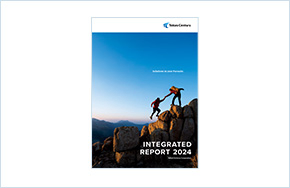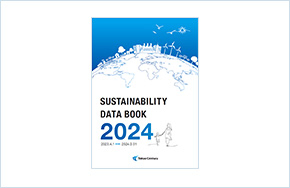Human Rights
Tokyo Century Group Human Rights Policy
We are mindful of corporate social responsibility, offer high expertise and a wide range of unique financial services by leveraging our flexible business domain, and have set out in our management philosophy that we will contribute to the creation of an environmentally sound, sustainable economy and society that enables economic development through the effective use of resources.
We have formulated this Human Rights Policy in accordance with our management philosophy and promote respect for human rights throughout our business activities.
Recognizing respect for human rights as a key issue, we will cultivate a corporate culture that allows diverse human resources to fully demonstrate their skills and individual characteristics to become a company where all officers and employees can hone their expertise and experience growth as well as a sense of pride.
1. Scope
This Human Rights Policy applies to all officers and employees of the Tokyo Century Group.
We expect all of our stakeholders, including customers and suppliers of Group companies, to also respect human rights.
2. Affirmed international standards
We endorse and have signed the United Nations Global Compact. We also refer to the International Bill of Human Rights (Universal Declaration of Human Rights and International Covenants on Human Rights), the UN Guiding Principles on Business and Human Rights, and the ILO Declaration on Fundamental Principles and Rights at Work* in implementing initiatives for respecting human rights.
*Freedom of association and the right to collective bargaining, elimination of all forms of forced or compulsory labor, the effective abolition of child labor, elimination of discrimination in respect of employment and occupation, and equal remuneration for work of equal value.
3. Legal compliance
We comply with the relevant laws and regulations in each country or region where we operate. Where there is a conflict between internationally recognized standards and regional laws or regulations, we will find a way to respect international standards.
4. Where the policy stands
This Human Rights Policy was established after deliberation by the Management Meeting followed by approval by the Board of Directors.
5. Human rights of all officers and employees
We respect the human rights of all officers and employees and strive to create a vibrant, rewarding working environment where everyone’s human rights and human dignity is respected. Furthermore, we promote diversity and inclusion in accordance with the separately established Basic Diversity Policy and foster a corporate culture that enables diverse talent to thrive in an environment free from discrimination based on race, religion, gender, age, sexual orientation, disability, and nationality.
6. Human rights due diligence
We recognize that our businesses and services have the potential to cause or contribute to adverse impacts on human rights in any domain, and we conduct appropriate due diligence to prevent or mitigate such impacts associated with our business activities.
7. Remedy
If we find that our business has caused or contributed to adverse impacts on human rights, we will strive to provide a remedy to those affected.
8. Dialogues with stakeholders
We will conduct dialogues with stakeholders on our human rights initiatives.
9. Communication and education
We engage in communication and education to ensure that all officers and employees understand the importance of respecting human rights and that the Human Rights Policy is incorporated in all aspects of our business activities. Additionally, we will conduct compliance-related training to confirm that we will not tolerate any discrimination or harassment and that our officers and employees will fully comply with related laws.
10. Information disclosure
We strive to ensure that stakeholders understand our initiatives based on the Human Rights Policy by disclosing information on our website and other media.
Human Rights Initiatives
1. Position on Human Rights
The Tokyo Century Group’s position on human rights is expressed in its Human Rights Policy as well as its Corporate Code of Conduct (4. Respect for Human Rights) and Our Action Guidelines (3. We will respect human rights and human dignity and create a rewarding working environment). We have declared our commitment to promoting respect for human rights in our business activities and expect our customers, suppliers, and other stakeholders to do so as well.
In terms of financing and investment, we have established the Environmental and Social Management Policy for Financing and Investment Activity, which clearly states that we will restrict financing and investment in businesses that have a significantly negative impact on the environment and society, based on the Basic Environmental Policy and the Human Rights Policy. We prohibit financing and investment in businesses associated with serious human rights violations, such as forced labor, child labor, and human trafficking, and in businesses involved in the production of inhumane weapons, such as chemical, biological, and nuclear weapons, as well as cluster munitions.
In addition, we comply with the Credit Policy, which indicates our basic stance on and approach to credit operations common to officers and employees. We have also adopted the perspective of respect for human rights as one of the criteria for evaluating credit transactions, which must be confirmed for every transaction.
2. Managing Human Rights Risks
Tokyo Century controls its human rights risks under comprehensive risk management as a system for understanding and evaluating risks associated with the Group as a whole, including human rights risks, and responding appropriately from both a qualitative and quantitative perspective as needed. The system is implemented by the Comprehensive Risk Management Committee, which periodically reports on the status of its activities to the Management Meeting and Board of Directors.
- Related Pages
We monitor human rights risks under this system by classifying them as “human rights and workplace environment risks” under “operational risks” and verify the appropriateness of our response.
3. Training and Education on Human Rights
We conduct the following training and educational activities to foster awareness of respect for human rights.
In addition, all officers and employees submit a Compliance Confirmation Form each year, pledging their commitment to the Corporate Code of Conduct and Our Action Guidelines, which include our human rights policies.
| Target | Major Themes |
|---|---|
| All officers and employees (Company-wide online training and training by job level) |
|
| Members of each division and branch (individual workplaces) |
|
| Staff responsible for human rights at Group companies |
|
4. System for Addressing Human Rights Violations (Relief Mechanism)
(1) Officers and employees of Group companies
As a means of addressing actual compliance violations, including harassment and human rights violations, or concerns over possible compliance violations, the Group operates an internal reporting system available to all officers and employees at Group companies in Japan and overseas (directors, executive officers, employees, contract employees, temporary employees, loaned employees, part-time employees, and others), as well as former employees within a year after their resignation.
- Related Pages
We make the utmost effort to ensure the anonymity of whistleblowers and maintain the confidentiality of their reports, and we will take remedial measures for victims in cases where human rights violations are found as a result of investigations into the cases reported.
We conduct an annual compliance survey of all officers and employees, with questions regarding compliance concerns including about human rights violations, and conduct hearings depending on the content of the response to prevent problems from occurring.
(2) Customers and other external stakeholders
As part of our efforts to promote respect for human rights in our business activities, we have established contact points for human rights consultation for customers and other external stakeholders.
Regardless of whether you do business with our Group or not, if you have noticed any human rights violations by Group companies or their officers or employees, please notify the following contact points. We will look into the matter and reply to you with the results of our investigation.
Contact Point for Human Rights Consultation
Compliance Office in the Risk Management Division Tokyo Century Corporation
5. Human Rights Due Diligence
We conduct PDCA cycles to effectively analyze, identify, and assess the negative human rights impacts associated with the Tokyo Century Group’s business activities and take corrective action to prevent or mitigate such impacts, with the cooperation of an external specialized organization.
(1) Human Rights Due Diligence by the Company and Its Consolidated Subsidiaries
Tokyo Century Corporation and all of its consolidated subsidiaries in Japan and overseas implemented human rights due diligence.
Our Due Diligence Process
After generating a long list of human rights risks related to our business, we narrowed them down to the items that were most relevant by taking into consideration the nature of our Group business and our stakeholders, and we identified human rights issues that require our vigilance. Then, to understand the current status of these issues, we analyzed the content of internal reporting cases as well as the results of the employee awareness and compliance surveys and conducted a questionnaire survey and interview at each company.
Identified Issues and Measures to Address Them
The risk identification process has identified no material risks and confirmed that Tokyo Century has properly established and implemented its human rights policies, internal whistleblowing system as a relief mechanism, reporting systems for compliance violations, incidents, and accidents, and human rights educational system.
On the other hand, we have found issues in the way we, as their parent company, sought to grasp the actual status of each subsidiary concerning their awareness of harassment, as well as human rights risks in areas like occupational health and safety and working hours. Specifically, we confirmed that there is room for improvement in how we disseminate our policies and monitor their implementation at each subsidiary.
We are currently implementing corrective actions for these issues. Our measures include enhancing information dissemination, reviewing monitoring items concerning personnel and labor affairs, including occupational injuries, and increasing the monitoring frequency. These efforts are grasped and evaluated by the Comprehensive Risk Management Committee, and then reported to the Management Meeting and the Board of Directors.
(2) Human Rights Risk Assessment of Investee Companies
We assess human rights risks during the decision-making process for making large investment and loans and when monitoring those that have been implemented. The assessment focuses on concerns such as the approach to human rights risks, any incidence of past violations, human rights risks that may arise because of the investment or loan, and measures to prevent and mitigate such risks. The discovery of any past evidence of child labor, forced labor, or human trafficking will, in principle, make the prospective business ineligible for investment. Similarly, if the target business is found likely to be associated with any of these three violations or with a potential life-threatening accident in the future, the effectiveness of mitigation measures will be carefully verified before confirming that the investment or loan can be made.
We will continue our efforts to ensure respect for human rights and to realize sustainable businesses by verifying human rights issues as they arise in the various aspects of our corporate operations and by consistently implementing PDCA cycles to prevent or mitigate any negative impacts on human rights.


